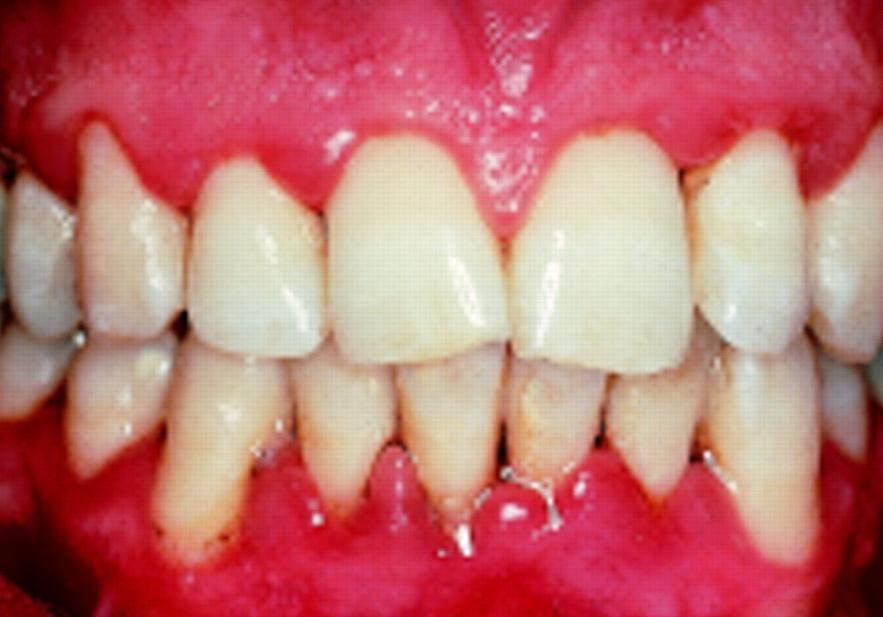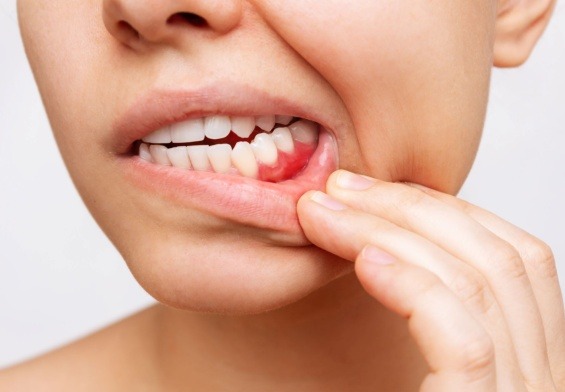 It’s probably safe to say that everybody has heard the term ‘gingivitis.’ Most people probably even know that gingivitis is gum disease. But do you know the impact it can have on your oral health? Yes, put simply, gingivitis is gum disease. The problem is that it’s not simple at all. If left untreated, gingivitis can lead to more serious oral health problems such as periodontitis, which is an inflammatory disease that affects the tissues surrounding and supporting your teeth. Once periodontitis sets in, it can cause bone loss which can then lead to tooth loss. The American Academy of Periodontology, a non-profit membership association for periodontists, lists gingivitis as a common, mild form of gum disease. Doesn’t sound so bad, right? Wrong! If this mild form of gum disease goes unchecked, it can lead to less common and far more serious forms of gum disease that can threaten the health of your teeth and its supporting structures. Thankfully, gingivitis often is easily prevented. It can even be treated once you get it, but why risk it? Why not just prevent it in the first place?! Following is more information on gingivitis, its causes, and what you can do to avoid getting it.
It’s probably safe to say that everybody has heard the term ‘gingivitis.’ Most people probably even know that gingivitis is gum disease. But do you know the impact it can have on your oral health? Yes, put simply, gingivitis is gum disease. The problem is that it’s not simple at all. If left untreated, gingivitis can lead to more serious oral health problems such as periodontitis, which is an inflammatory disease that affects the tissues surrounding and supporting your teeth. Once periodontitis sets in, it can cause bone loss which can then lead to tooth loss. The American Academy of Periodontology, a non-profit membership association for periodontists, lists gingivitis as a common, mild form of gum disease. Doesn’t sound so bad, right? Wrong! If this mild form of gum disease goes unchecked, it can lead to less common and far more serious forms of gum disease that can threaten the health of your teeth and its supporting structures. Thankfully, gingivitis often is easily prevented. It can even be treated once you get it, but why risk it? Why not just prevent it in the first place?! Following is more information on gingivitis, its causes, and what you can do to avoid getting it.
How Gingivitis happens
Gingivitis typically is caused by plaque, and plaque is caused by bacteria. Plaque is the film that collects on your teeth when you eat or drink something. Plaque is what results from bacteria deposited on the teeth, and when that bacteria aren’t removed in a timely manner, all oral heck can break loose. When unhealthy bacteria collect on your teeth, that resulting film that coats your teeth needs to be removed. The fact about bacteria is that there are good bacteria and bad bacteria. It’s important for the good bacteria to break down food particles, but when poor oral hygiene habits are observed, bad bacteria can build up and cause gingivitis that can lead to cavities, tooth decay, tooth loss, and even bone loss.
How to tell if you have Gingivitis
Not all gingivitis causes pain, but that doesn’t mean it isn’t having a negative effect on your mouth. One of the first signs of gingivitis is bad breath, especially if it becomes chronic. From there, this mild form of gum disease, if left untreated, can lead to red, swollen gums that can even cause bleeding in your mouth. People who are experiencing any of the symptoms of untreated gingivitis need to see their family dentist in order to prevent further oral health problems such as periodontitis. If you’re experiencing any of the symptoms of gingivitis, contact a top dentist in Clearwater for proper treatment, before further problems set in. The symptoms of periodontitis include bright red or even purple gums; red, swollen gums; bleeding gums; gum sensitivity; a bad taste in the mouth; loose teeth; spaces between the teeth; receding gums that make teeth look longer in appearance than they should; and even pus between the teeth and abnormal bite alterations. Once these problems occur, they’re much more difficult to treat, so it’s important for those experiencing any of the above symptoms to see their family dentist as soon as possible.
Prevent Gingivitis
The good news is that gingivitis and its negative effects often are easily prevented. How? You guessed it … with good oral hygiene habits. Twice-daily brushing, at least once-daily flossing, and regular visits to your family dentist often are all it takes to avoid the sometimes devastating effects resulting from untreated gingivitis. Brush your teeth twice a day with a toothpaste that contains fluoride as the first step to preventing gum disease. Follow this with the equally important step of flossing your teeth at least once a day. And, of course, visiting a top dentist in your neighborhood is a given. Without regular dental checkups, you have no way of knowing about changes that may be going in your mouth that you can’t see. Additionally, it helps to eat foods that are rich in nutrients. Crunchy raw vegetables are excellent for cleaning food particles from your teeth, and they help to provide the necessary vitamins and minerals your body needs. Another important fact about preventing gingivitis is that saliva is vital to maintaining proper oral health. If you’re someone who suffers from dry mouth, especially if you’re on regular medications, you need to take steps to keep your mouth properly hydrated to help flush bad bacteria out of your mouth regularly. You can do this by drinking plenty of water every day and by chewing sugarless gum, as it helps to replenish saliva and stave off dry mouth.



